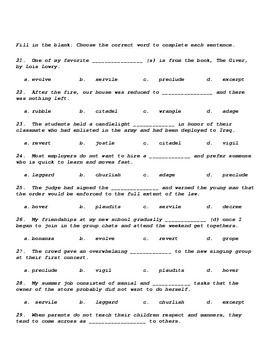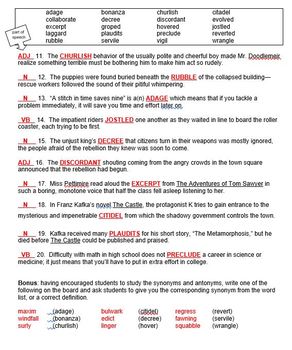Have you ever stumbled across a word that feels like a puzzle you can’t solve, a key that unlocks a door to understanding a new concept? That’s the power of vocabulary. Mastering complex words can elevate your comprehension, empower you to express your ideas more effectively, and even unlock opportunities for academic and professional advancement. This is precisely why the Vocab Workshop series has become a cornerstone of language learning, and Unit 4 of Level C presents a particularly captivating and challenging set of words that will expand your vocabulary in intriguing ways.

Image: www.teacherspayteachers.com
Whether you are a student grappling with challenging texts, a professional aiming to impress in presentations, or simply a curious individual who enjoys the art of language, understanding the vocabulary from Vocab Workshop Level C Unit 4 can be an enriching journey. This article will provide a comprehensive analysis of the key words, explore their nuances, and demonstrate how they can be applied in everyday language and writing. We will delve into word origins, examine their historical and cultural contexts, and explore how these words have evolved over time. So, let’s embark on this exciting linguistic voyage together.
Embracing Complexity: The Words of Level C Unit 4
The words chosen for Vocab Workshop Level C Unit 4 are not mere entries in a dictionary—they are multifaceted tools that can be used to express subtle shades of meaning and evoke powerful imagery. Let’s dissect these words, understand how they work, and discover their remarkable capacity to enhance our communication.
1. Acrimonious (adjective): Marked by bitterness and sharpness.
The word “acrimonious” paints a vivid picture of a conflict fueled by bitterness. Imagine a heated debate where accusations fly back and forth, each word dripping with venom. That’s the atmosphere an acrimonious exchange creates.
- Example: “The acrimonious divorce proceedings dominated the local news for weeks.”
2. Ambivalent (adjective): Having mixed feelings or contradictory ideas about something.
We all experience conflicting emotions, and “ambivalent” describes that state of feeling pulled in two different directions. Feeling both excited and apprehensive about a new job offer? Voila, you’re feeling ambivalent.
- Example: “She was ambivalent about her new job, unsure if she could handle the workload.”

Image: pdfprof.com
3. Capricious (adjective): Unpredictable or whimsical.
Imagine a playful kitten darting this way and that, its movements erratic and seemingly random. That’s the essence of “capricious.” It refers to things that change quickly and without clear reason.
- Example: “The capricious weather patterns made it difficult to plan outdoor activities.”
4. Chicanery (noun): The use of trickery or deception.
When someone uses cunning tactics to gain an unfair advantage, that’s chicanery. Think of a sneaky politician who twists facts to manipulate public opinion – that’s chicanery at work.
- Example: “The lawyer was accused of using chicanery to win the case.”
5. Circumspect (adjective): Cautious and careful; prudent.
Before making a major decision, it’s wise to be circumspect. This means weighing the pros and cons, considering the potential consequences, and acting with caution and thoughtfulness.
- Example: “The investor was circumspect about making a major investment in the volatile market.”
6. Cogent (adjective): Clear, logical, and convincing.
Have you ever heard an argument that was so well-presented, so clear and logically sound, that it left you convinced? That’s the power of a cogent argument. It is persuasive because it is both logical and clear.
- Example: “The professor’s argument for a new curriculum was cogent and well-supported with evidence.”
7. Convivial (adjective): Pleasant and sociable; enjoying the company of others.
Imagine a lively gathering where laughter rings out and everyone enjoys each other’s company. That’s a convivial atmosphere. This word captures the essence of a happy and celebratory social environment.
- Example: “The party was convivial, filled with lively conversation and good cheer.”
8. Didactic (adjective): Intended to teach something.
Didactic works of art, literature, or even films aim to teach a specific lesson or moral. They often have a message that the writer wants the audience to learn.
- Example: “The children’s book contained a didactic message about the importance of sharing.”
9. Disparate (adjective): Different; distinct from one another.
When things are disparate, they stand apart in terms of nature, quality, or characteristics. Imagine a collection of objects, each with its own unique identity and no common ground.
- Example: “The company’s workforce was disparate, representing a wide range of ages, backgrounds, and skills.”
10. Ephemeral (adjective): Lasting for a very short time; fleeting.
Life is full of fleeting moments that we cherish. A beautiful sunset, a child’s innocent laughter – these are ephemeral experiences that vanish quickly but leave a lasting impression.
- Example: “The ephemeral beauty of the cherry blossoms captivated all who witnessed them.”
11. Esoteric (adjective): Understood by only a select few; specialized or obscure.
Certain topics are so complex or abstract that only individuals with specialized knowledge can truly comprehend them. That’s the nature of esoteric knowledge.
- Example: “The philosopher’s lecture on quantum physics was considered esoteric, even among experts in the field.”
12. Exonerate (verb): To clear (someone) of blame or suspicion.
Imagine being wrongly accused and then having the evidence presented to clear your name. That’s the meaning of being exonerated – to be proven innocent and have the blame lifted.
- Example: “The DNA evidence exonerated the suspect in the crime.”
13. Flippant (adjective): Not showing seriousness or respect.
When someone makes light of a serious situation or treats a weighty topic with casual indifference, that’s flippancy. It can come across as disrespectful or insensitive.
- Example: “The student’s flippant remarks about the professor’s lecture didn’t go over well.”
14. Gregarious (adjective): Fond of company; sociable.
If you love being surrounded by people, enjoy socializing, and can’t imagine a life without being part of a group, then you are gregarious.
- Example: “Gregarious by nature, she was always the life of the party.”
15. Impeccable (adjective): Flawless; perfect; without fault or error.
Imagine a piece of art that is so flawlessly executed, so meticulously detailed, that it leaves you speechless. That’s an example of something that is impeccable – beyond reproach.
- Example: “The pianist gave an impeccable performance, showcasing her mastery of the instrument.”
16. Incidental (adjective): Not essential; happening by chance or by the way.
Sometimes things happen that are not planned or expected – these are incidental events. While not central to the main happening, they can nevertheless be significant.
- Example: “The dog’s appearance at the picnic was incidental but welcomed by the children.”
17. Incongruous (adjective): Not matching or in keeping with something else; out of place.
Imagine a formal black-tie event where a guest arrives wearing a clown costume— that would be incongruous, a sharp clash of styles that doesn’t fit the occasion.
- Example: “The incongruous sight of a penguin in the desert startled the tourists.”
18. Inculcate (verb): To instill (an idea or belief) by persistent instruction.
To inculcate an idea is to instill it deeply, embed it in someone’s thinking over time. Think of a teacher who patiently teaches a lesson, reinforcing it until it becomes part of the student’s understanding.
- Example: “The teacher worked hard to inculcate in her students a love of reading.”
19. Indolent (adjective): Lazy and inactive; disinclined to work or exert oneself.
If you spend your days lounging around, avoiding any form of effort or activity, then you might be considered indolent. It’s a synonym for lazy, but with a deeper sense of disinterest in exertion.
- Example: “On a sunny afternoon, she was content to be indolent, enjoying a book and a glass of lemonade.”
20. Ineffable (adjective): Too great or extreme to be expressed in words; indescribable.
There are experiences in life that are so profound, so overwhelming, that words seem inadequate to capture their essence. Those are ineffable moments – beyond the power of language to express.
- Example: “The beauty of the sunrise was ineffable; it simply had to be experienced.”
Vocab Workshop Level C Unit 4 Answers
Unlocking the Power of Words
Understanding the words in Vocab Workshop Level C Unit 4 is about more than just memorizing definitions. It’s about gaining a deeper understanding of the nuances of language, the power of words to paint vivid images, and the ability to express complex ideas with precision. These words aren’t just for formal essays or academic writing; they enhance your everyday conversations, elevate your writing, and empower you to express yourself with greater clarity and sophistication.
So, embrace the challenge, delve into the meanings of these remarkable words, and discover how they can enrich your understanding of the world around you. This journey into language is not just about vocabulary; it’s about unlocking the potential of your own communication skills and becoming a more effective and expressive communicator.
This article is just the first step on your path to word mastery. Keep exploring, keep reading, and keep refining your vocabulary. The beauty and power of language are waiting to be discovered by you.






